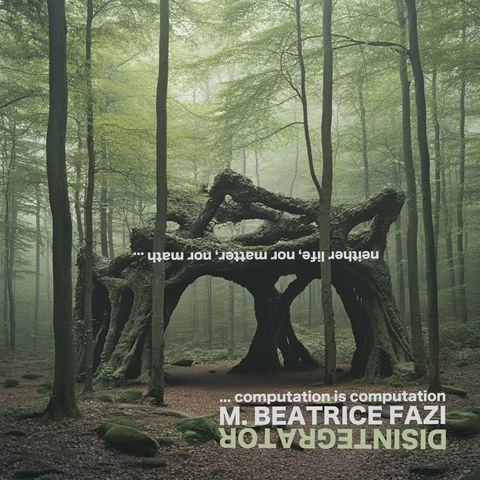17. Computation is Computation (w/ M. Beatrice Fazi)

Download and listen anywhere
Download your favorite episodes and enjoy them, wherever you are! Sign up or log in now to access offline listening.
17. Computation is Computation (w/ M. Beatrice Fazi)
Description
This episode features one of our most anticipated guests: M. Beatrice Fazi. M. Beatrice Fazi is a philosopher working in philosophy of computation, philosophy of technology and media philosophy. In...
show moreM. Beatrice Fazi is a philosopher working in philosophy of computation, philosophy of technology and media philosophy. In this episode we mostly cover some key definitions relating to computation and its onto-epistemology grounded in Fazi’s landmark book, Contingent Computation: Abstraction, Experience, and Indeterminacy in Computational Aesthetics published in 2018. But our discussion doesn't end in 2018.
Now more than ever, Fazi`s work on computation holds unbelievable importance with wide-ranging implications. Philosophy is becoming a major foil to technocapital and technopolitics, forcing us to seriously (re)consider fundamental questions about technology and correlated fundamentals of knowledge and being.
Ever wondered what computation actually is? According to Fazi, it exists and unfolds not only as a function, but also as a creative modality forming its own conditions for existence. This episode dives deep into the concept of computation as an autonomous form of thought and creation, that is nevertheless contingent, i.e. not independent from the material conditions of the world.
We move further into Fazis more recent work in ontology: the triangulation of abstraction, representation and thought. This pushes us into massive questions - what does computation mean for the future of thought? How should we conceptualize the relationship between humans and technology? And why should we rethink the idea of technology as merely an extension of ourselves?
Relevant Links & References:
- Fazi’s landmark book, Contingent Computation: Abstraction, Experience, and Indeterminacy in Computational Aesthetics—still essential reading for anyone interested in the philosophy of technology. About the fundamentals of what computation does and what material, ontological and epistemological consequences this holds.
- Brian Cantwell Smith’s essay, “The Foundations of Computing” (2003)—a text we explore, even if Fazi offers a different perspective on the nature of computation.
- Oh, also, look to Anil Bawa-Cavia's (life changing) episode of Interdependence, where he enumerates further on computational functionalism, computational realism, but more importantly for more color on the paths to incompleteness traced in Gödel and Turing -- to which Fazi builds her main thesis: these incompletenesses are actually strengths and not limitations of computation.
Information
| Author | Marek Poliks, Roberto Alonso |
| Organization | Marek Poliks |
| Website | - |
| Tags |
Copyright 2024 - Spreaker Inc. an iHeartMedia Company
